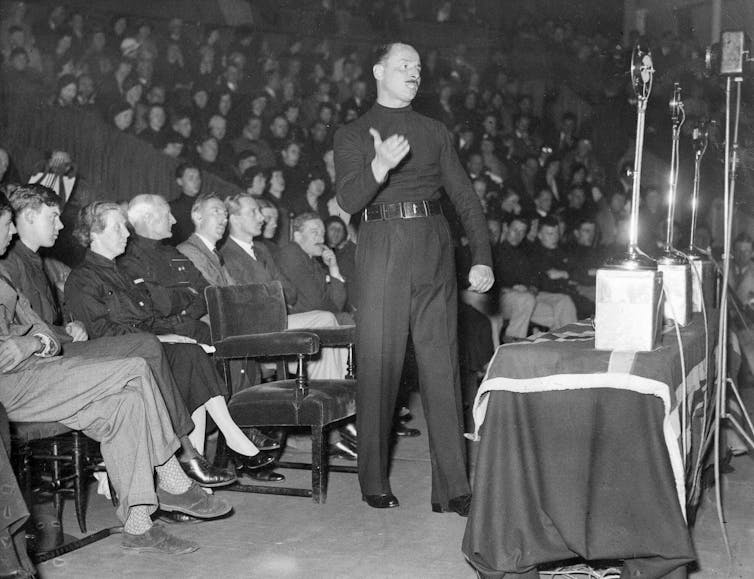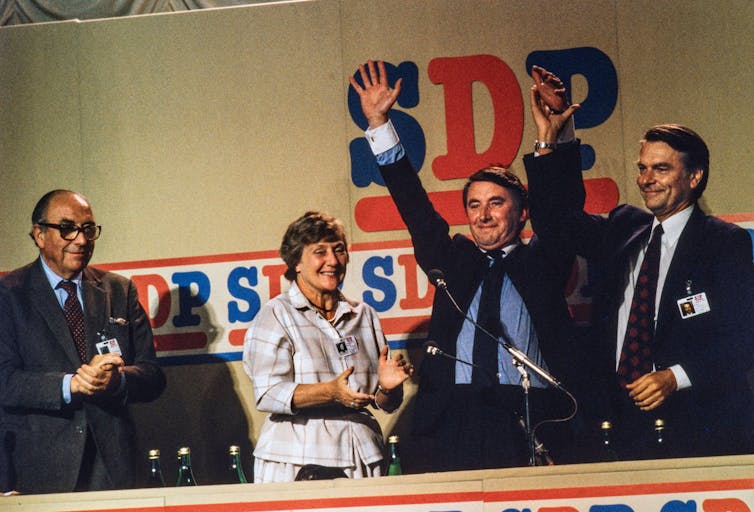The hitherto Conservative MP for Dover, Natalie Elphicke, has sensationally defected to the Labour occasion. This has despatched shockwaves by means of Westminster, as Elphicke was a determine on the suitable of the Conservative occasion.
Along with embarrassing Prime Minister Rishi Sunak, this defection has induced important disquiet inside Labour, the place many MPs and activists really feel her prior stances on a spread of points jar with Labour insurance policies.
Elphicke’s transfer got here simply days after Daniel Poulter, Conservative MP for Central Suffolk and North Ipswich, had additionally defected to Labour. However these two are removed from the primary to cross the aisle on this method.
We don’t but know if Elphicke’s transfer shall be consequential in the long run and she or he isn’t standing within the subsequent election, so this might be little greater than a brief sharp shock. However historical past exhibits us defections can result in monumental change. These are 4 such examples.
1. The Peelites depart the Tories
Robert Peel was prime minister from December 1834 to April 1835 and later from August 1841 to June 1846. He’s arguably one of the important figures in British political historical past. Previous to his premiership, he served as residence secretary and based the London Metropolitan Police (therefore the colloquial identify “Bobbies”). However he was additionally instrumental within the creation of the trendy Conservative Social gathering from its predecessor, the Tory Social gathering.
Peel was a believer in free commerce at a time when many in his occasion have been protectionists who sought to maintain costs excessive for home producers. For his backbenchers, probably the most sacred of those tariffs have been the corn legal guidelines, restrictions on grain imports that benefited landowners.
Within the autumn of 1845, a potato blight swept throughout Eire destroying successive potato crops – resulting in a famine that finally killed roughly a million folks. Peel argued that this necessitated the repeal of the corn legal guidelines, which he did in 1846.
Peel’s opponents inside his occasion believed – possible appropriately – that Peel was cynically utilizing the famine as a pretext to justify repeal. The parliamentary occasion cut up and Peel resigned.
A 3rd of the occasion continued to again Peel however, over time, this rump dwindled to a handful. In 1859, these members coalesced with the Whig and Radical MPs right into a single Liberal occasion below Lord Palmerston.
2. Oswald Mosley: Conservative, Labour, fascist
Oswald Mosley is greatest remembered because the chief of the New Social gathering, which turned the British Union of Fascists. In 1936, he and his Blackshirts famously tried to march by means of the London’s East Finish, the place they have been met by Jewish, socialist, communist and commerce unionist counter-protestors. The ensuing conflict, often known as the the Battle of Cable Road, noticed 150 folks arrested and an estimated 175 injured.
The battle was the end result of a major journey for Mosley, who moved between occasion affiliations on a number of events. In 1918, he efficiently stood for parliament in Harrow as a Conservative however quickly turned disenchanted with the occasion, and against its coverage concerning Eire. He reviled the violence of the Black and Tans – usually former British servicemen recruited into the Royal Irish Constabulary – in opposition to the Irish public.

Alamy
In 1920, Mosley crossed the ground and sat as an unbiased MP. In 1923, the Conservatives fell far in need of a majority in parliament. Labour turned the second largest occasion and shortly shaped a authorities. Mosley decried his fellow Conservatives as a “panic stricken plutocracy” and joined Labour two months later.
In 1929, Mosley joined the federal government shaped by Labour chief Ramsey MacDonald shaped with the assist of the Conservatives, and was tasked with tackling unemployment. The Nice Melancholy hit quickly after and he drew up the Mosley memorandum, a nationalist doc extremely vital of laissez-faire economics. The concepts have been rejected and Mosley resigned from the cupboard in Might 1930. His rhetoric more and more turned fascistic, calling for an “iron spirit and can”, and by 1931 he had shaped the New Social gathering.
3. Winston Churchill rats and re-rats
Maybe probably the most well-known parliamentarian and prime minister of all time, Winston Churchill, was not all the time the titan of second world battle Conservative politics we keep in mind him as. He first entered parliament as an MP in 1900 as a Conservative, having unsuccessfully stood for election the 12 months earlier than. Nonetheless, he had an uneasy relationship together with his occasion because it adopted protectionist financial insurance policies, and he was an advocate of free commerce.
In 1904 the federal government introduced ahead the aliens invoice which aimed to cut back the move of Jewish migrants, fleeing persecution from the Russian empire, from coming into the nation. Churchill opposed the invoice and on Might 31 he crossed the ground and joined the Liberals. Nonetheless, his time with the Liberal occasion was to not final. Churchill misplaced his seat within the 1922 normal election.
In 1924, Churchill made a cope with the Tory chief Stanley Baldwin and stood as soon as extra as a Conservative candidate. Within the phrases of his future assistant non-public secretary, Jock Colville: “That they had stated you could possibly rat however you couldn’t re-rat”. Churchill had nonetheless managed it. As everyone knows, he nonetheless went on to guide Britain by means of the existential disaster of the second world battle.
4. The gang of 4 leaves Labour
In 1981, the Labour Social gathering below Michael Foot determined to alter the principles on occasion management elections, notably by giving 40% of the votes to commerce unions.
This, along with different leftward shifts, appalled members of the Labour proper. 4 key folks – David Owen, Shirley Williams, William Rodgers and Roy Jenkins – drafted the Limehouse declaration, expressing their opposition to Foot’s strategy.

Alamy
This “gang of 4” quickly gained the assist of further MPs and on March 2, 12 Labour MPs resigned the occasion whip to kind the brand new Social Democratic Social gathering (SDP). In all, 13 Labour MPs and one Conservative MP joined the occasion. By the 1983 normal election, the SDP had joined forces with the Liberal Social gathering to kind the SDP-Liberal alliance.
The alliance received a major share of the favored vote within the 1983 normal election – some 25.4%. This contributed to a Conservative landslide for Prime Minister Margaret Thatcher, cementing her authority and talent to reshape the nation.

























